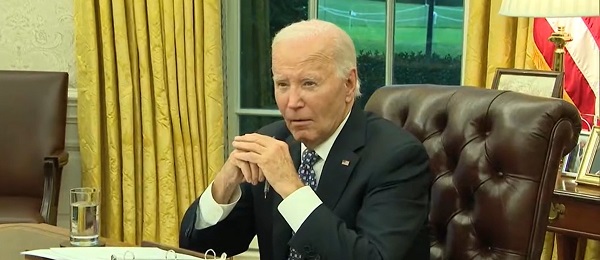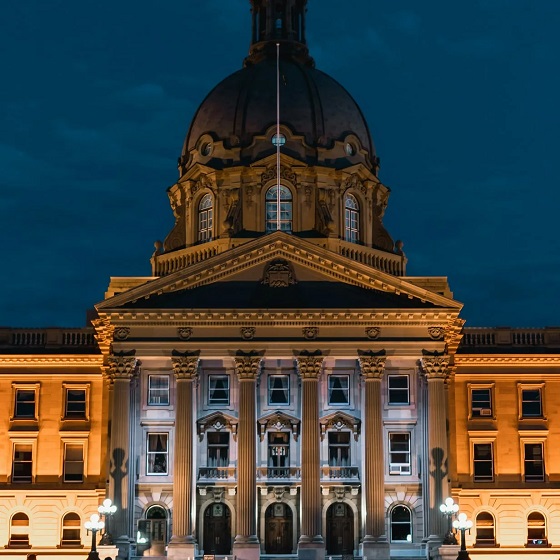Business
Biden goes after Facebook for eliminating ‘fact-checkers’: ‘Really shameful’

From LifeSiteNews
By Dan Frieth
Biden’s statements came on the same day Mark Zuckerberg appeared on The Joe Rogan Experience, revealing that the Biden administration had actively pressured Meta to censor content related to COVID-19
President Joe Biden harshly criticized Meta’s decision to eliminate its professional fact-checking program in favor of user-driven community notes, labeling the move as “really shameful.” His comments, delivered during a press conference following a speech on economic progress, reveal a concerning push for increased control over online discourse.
Biden’s statements came on the same day Mark Zuckerberg appeared on The Joe Rogan Experience, revealing that the Biden administration had actively pressured Meta to censor content related to COVID-19. Zuckerberg disclosed that officials repeatedly contacted Meta, demanding the removal of memes and truthful posts critical of COVID-19 vaccines. He recounted how the White House would “call up our team and scream at them and curse” over content they deemed unacceptable.
Zuckerberg pointed to a specific incident where the administration pushed for the deletion of a meme featuring Leonardo DiCaprio pointing at a TV with a caption suggesting future legal actions over the COVID-19 vaccine. Zuckerberg resisted, stating, “No we’re not we’re not going to take down humor,” emphasizing that his team would not remove content that was humorous and not factually false. Despite Meta’s history of censoring similar content, Zuckerberg insisted, “Basically, it just got to this point where we were like no, we’re not going to take down things that are true. That’s ridiculous.”
Zuckerberg also said that the Biden administration pressured for the censorship of truthful information.
“Basically, it just got to this point where we were like no, we’re not going to take down things that are true,” Zuckerberg said. “That’s ridiculous.”
Zuckerberg’s decision to dismantle the platform’s fact-checking system announced just before President-elect Donald Trump’s inauguration, has drawn polarized reactions. While Democrats decry the change, Republicans, including Trump, have long accused Meta of silencing conservative voices. Zuckerberg openly admitted that scaling back content moderation might allow more harmful content to circulate, but he also recognized the need to move away from biased oversight.
Biden criticized the autonomy of private tech leaders, stating, “The idea that, you know, a billionaire can buy something and say, ‘By the way, from this point on, we’re not going to fact-check anything.’ And you know, when you have millions of people reading, going online, reading this stuff … I think it’s really shameful.”
Reprinted with permission from Reclaim The Net.
Business
Loblaws Owes Canadians Up to $500 Million in “Secret” Bread Cash

Yakk Stack
(Only 5 Days Left!) Claim Yours Before It’s GONE FOREVER
Hey, all.
Imagine this…you’re slicing into that fresh loaf from Loblaws or just making a Wonder-ful sammich, the one you’ve bought hundreds of times over the years, and suddenly… ka-ching!
A fat check lands in your mailbox.
Not from a lottery ticket, not from a side hustle – from the very store that’s been quietly owing you money for two decades of illegal price fixing.
Sound too good to be true?
It’s real.
It’s court-approved.
And right now, on December 7, 2025, you’ve got exactly 5 days to grab your share before the door slams shut. Don’t let this slip away – keep reading, feel that spark of possibility ignite, and let’s get you paid.
Back in 2001, you were probably juggling work, kids, or just surviving on that weekly grocery run. Little did you know, while you were reaching for the President’s Choice white bread or those golden rolls, Loblaws and their cronies were playing a sneaky game of price-fixing. They jacked up the cost of packaged bread across Canada – every loaf, every bun, every sneaky sandwich slice. For 20 years. From coast to coast to coast.
And now…the courts have spoken. $500 million in settlements to make it right. That’s not pocket change – that’s your money, recycled back into your life.
Given the number of people who will be throwing in a claim…this ain’t gunna be life-changing cash…but also, given the cost of food in Canada, it’s better than sweet fuck all, which you will receive by NOT doing this.
If you’re a Canadian resident (yep, that’s you, unless you’re in Quebec with your own sweet deal), and you’ve ever bought bread for your family – not for resale, just real life – between January 1, 2001, and December 31, 2021… you’re in.
No receipts needed.
No fancy proofs.
Just you, confirming your story, and boom – eligible.
Quick check: Were you under 18 back then?
Or an exec at Loblaw?
Nah, skip it.
But for the rest of us everyday schleps…Jackpot.
Again…the clock’s ticking on this.
Claims opened on September 11, 2025, and slam shut on December 12, 2025.
That’s this Friday.
Payments roll out in 2026, 6-12 months later, straight to your bank or mailbox.
Here’s what you need to do…
- Breathe deep, click → HEREQuebec frens →HERE
- 10 second form that’s completed by your autofill…30 seconds off of a mobile device.
- Hit submit and wait for that sweet cash to hit your account.
Again…this won’t be life saving money and most certainly ain’t gunna hit your account before Christmas.
And before you go out an Griswald yourself into a depost on pool in the backyard…you may only end up with enough cash for the Jam-of-the-Month…the gift that truly does give, all year round…just be a little patient.
If you end up with a couple of backyard steaks in time for summer…
Some treats for the children or grandchildren…
Maybe just a donation to the foodbank…
This is what’s owed to you. Your neighbors. Friends. Family.
Take advantage!
Banks
To increase competition in Canadian banking, mandate and mindset of bank regulators must change

From the Fraser Institute
By Lawrence L. Schembri and Andrew Spence
Canada’s weak productivity performance is directly related to the lack of competition across many concentrated industries. The high cost of financial services is a key contributor to our lagging living standards because services, such as payments, are essential input to the rest of our economy.
It’s well known that Canada’s banks are expensive and the services that they provide are outdated, especially compared to the banking systems of the United Kingdom and Australia that have better balanced the objectives of stability, competition and efficiency.
Canada’s banks are increasingly being called out by senior federal officials for not embracing new technology that would lower costs and improve productivity and living standards. Peter Rutledge, the Superintendent of Financial Institutions and senior officials at the Bank of Canada, notably Senior Deputy Governor Carolyn Rogers and Deputy Governor Nicolas Vincent, have called for measures to increase competition in the banking system to promote innovation, efficiency and lower prices for financial services.
The recent federal budget proposed several new measures to increase competition in the Canadian banking sector, which are long overdue. As a marker of how uncompetitive the market for financial services has become, the budget proposed direct interventions to reduce and even eliminate some bank service fees. In addition, the budget outlined a requirement to improve price and fee transparency for many transactions so consumers can make informed choices.
In an effort to reduce barriers to new entrants and to growth by smaller banks, the budget also proposed to ease the requirement that small banks include more public ownership in their capital structure.
At long last, the federal government signalled a commitment to (finally) introduce open banking by enacting the long-delayed Consumer Driven Banking Act. Open banking gives consumers full control over who they want to provide them with their financial services needs efficiently and safely. Consumers can then move beyond banks, utilizing technology to access cheaper and more efficient alternative financial service providers.
Open banking has been up and running in many countries around the world to great success. Canada lags far behind the U.K., Australia and Brazil where the presence of open banking has introduced lower prices, better service quality and faster transactions. It has also brought financing to small and medium-sized business who are often shut out of bank lending.
Realizing open banking and its gains requires a new payment mechanism called real time rail. This payment system delivers low-cost and immediate access to nonbank as well as bank financial service providers. Real time rail has been in the works in Canada for over a decade, but progress has been glacial and lags far behind the world’s leaders.
Despite the budget’s welcome backing for open banking, Canada should address the legislative mandates of its most important regulators, requiring them to weigh equally the twin objectives of financial system stability as well as competition and efficiency.
To better balance these objectives, Canada needs to reform its institutional framework to enhance the resilience of the overall banking system so it can absorb an individual bank failure at acceptable cost. This would encourage bank regulators to move away from a rigid “fear of failure” cultural mindset that suppresses competition and efficiency and has held back innovation and progress.
Canada should also reduce the compliance burden imposed on banks by the many and varied regulators to reduce barriers to entry and expansion by domestic and foreign banks. These agencies, including the Office of the Superintendent of Financial Institutions, Financial Consumer Agency of Canada, Financial Transactions and Reports Analysis Centre of Canada, the Canada Deposit Insurance Corporation plus several others, act in largely uncoordinated manner and their duplicative effort greatly increases compliance and reporting costs. While Canada’s large banks are able, because of their market power, to pass those costs through to their customers via higher prices and fees, they also benefit because the heavy compliance burden represents a significant barrier to entry that shelters them from competition.
More fundamental reforms are needed, beyond the measures included in the federal budget, to strengthen the institutional framework and change the regulatory mindset. Such reforms would meaningfully increase competition, efficiency and innovation in the Canadian banking system, simultaneously improving the quality and lowering the cost of financial services, and thus raising productivity and the living standards of Canadians.
-

 Automotive24 hours ago
Automotive24 hours agoTrump Deals Biden’s EV Dreams A Death Blow
-

 Focal Points1 day ago
Focal Points1 day agoPharma Bombshell: President Trump Orders Complete Childhood Vaccine Schedule Review
-

 Automotive23 hours ago
Automotive23 hours agoCanada’s EV Mandate Is Running On Empty
-

 Business14 hours ago
Business14 hours agoWhy Does Canada “Lead” the World in Funding Racist Indoctrination?
-

 Energy2 days ago
Energy2 days agoSenate votes to reopen Alaska Coastal Plain to energy leasing
-

 Daily Caller2 days ago
Daily Caller2 days agoTrump Orders Review Of Why U.S. Childhood Vaccination Schedule Has More Shots Than Peer Countries
-

 Alberta2 days ago
Alberta2 days agoA Memorandum of Understanding that no Canadian can understand
-

 Censorship Industrial Complex2 days ago
Censorship Industrial Complex2 days agoFrances Widdowson’s Arrest Should Alarm Every Canadian












